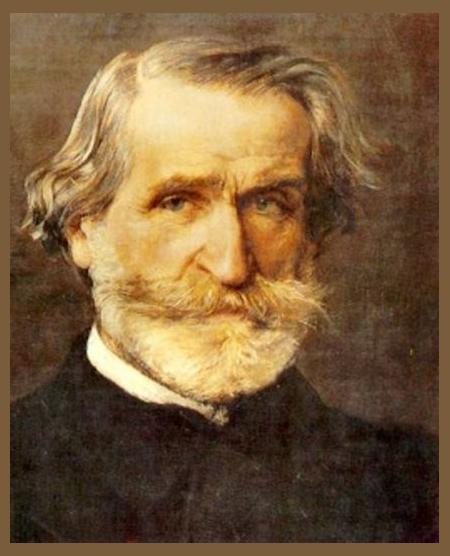 Giuseppe Verdi
Giuseppe Verdi
Giuseppe Verdi: The Maestro of Italian Opera
Giuseppe Verdi, the legendary Italian composer, etched his name in the annals of musical history with his captivating operas, including the renowned "La Donna è Mobile" from "Rigoletto." Verdi's journey was marked by both triumph and tribulation, shaping his artistic legacy.
Early Life and Influences:
Born into a humble family in Busseto, Italy, on October 10, 1813, Verdi displayed an early passion for music. Despite financial constraints, he pursued his studies, influenced by the works of Rossini and Bellini. His first opera, "Oberto, Conte di San Bonifacio," debuted in 1839, but failed to gain significant recognition.
Breakthrough and Controversies:
Verdi's breakthrough came with "Nabucco" (1842), which garnered immense popularity due to its stirring choral music and patriotic themes. However, his subsequent operas, such as "La Traviata" (1853), faced censorship due to their portrayal of controversial subjects like prostitution.
Artistic Maturity and Triumphs:
Undeterred, Verdi continued to compose with vigor. His later works, including "Aida" (1871) and "Otello" (1887), showcased his mastery of orchestration and dramatic storytelling. Verdi's operas captured the social and political currents of his time, resonating deeply with audiences.
Personal Life and Final Years:
Verdi was a private and introspective man. He married Margherita Barezzi in 1836, but tragedy struck when she and their two children passed away. He later found solace with Giuseppina Strepponi, a renowned opera singer. Verdi's last completed opera, "Falstaff" (1893), was a testament to his enduring creative spirit.
Legacy and Impact:
Giuseppe Verdi's music continues to enchant audiences worldwide. His operas are renowned for their powerful melodies, dramatic intensity, and emotional depth. Verdi's influence extends far beyond the world of opera, inspiring composers, musicians, and artists of all genres.
Discography (Partial):
* Oberto, Conte di San Bonifacio (1839)
* Nabucco (1842)
* Rigoletto (1851)
* La Traviata (1853)
* Aïda (1871)
* Otello (1887)
* Falstaff (1893)
Members:
While Verdi composed the music and librettos for his operas, the performances were brought to life by renowned singers and musicians. Some notable performers associated with Verdi's works include:
* Giovanni Battista Rubini (tenor)
* Teresa Stolz (soprano)
* Francesco Tamagno (tenor)
* Maria Callas (soprano)
* Luciano Pavarotti (tenor)
Giuseppe Verdi, the legendary Italian composer, etched his name in the annals of musical history with his captivating operas, including the renowned "La Donna è Mobile" from "Rigoletto." Verdi's journey was marked by both triumph and tribulation, shaping his artistic legacy.
Early Life and Influences:
Born into a humble family in Busseto, Italy, on October 10, 1813, Verdi displayed an early passion for music. Despite financial constraints, he pursued his studies, influenced by the works of Rossini and Bellini. His first opera, "Oberto, Conte di San Bonifacio," debuted in 1839, but failed to gain significant recognition.
Breakthrough and Controversies:
Verdi's breakthrough came with "Nabucco" (1842), which garnered immense popularity due to its stirring choral music and patriotic themes. However, his subsequent operas, such as "La Traviata" (1853), faced censorship due to their portrayal of controversial subjects like prostitution.
Artistic Maturity and Triumphs:
Undeterred, Verdi continued to compose with vigor. His later works, including "Aida" (1871) and "Otello" (1887), showcased his mastery of orchestration and dramatic storytelling. Verdi's operas captured the social and political currents of his time, resonating deeply with audiences.
Personal Life and Final Years:
Verdi was a private and introspective man. He married Margherita Barezzi in 1836, but tragedy struck when she and their two children passed away. He later found solace with Giuseppina Strepponi, a renowned opera singer. Verdi's last completed opera, "Falstaff" (1893), was a testament to his enduring creative spirit.
Legacy and Impact:
Giuseppe Verdi's music continues to enchant audiences worldwide. His operas are renowned for their powerful melodies, dramatic intensity, and emotional depth. Verdi's influence extends far beyond the world of opera, inspiring composers, musicians, and artists of all genres.
Discography (Partial):
* Oberto, Conte di San Bonifacio (1839)
* Nabucco (1842)
* Rigoletto (1851)
* La Traviata (1853)
* Aïda (1871)
* Otello (1887)
* Falstaff (1893)
Members:
While Verdi composed the music and librettos for his operas, the performances were brought to life by renowned singers and musicians. Some notable performers associated with Verdi's works include:
* Giovanni Battista Rubini (tenor)
* Teresa Stolz (soprano)
* Francesco Tamagno (tenor)
* Maria Callas (soprano)
* Luciano Pavarotti (tenor)